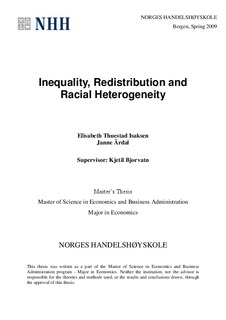Inequality, redistribution and racial heterogeneity
Master thesis
Permanent lenke
http://hdl.handle.net/11250/168313Utgivelsesdato
2009Metadata
Vis full innførselSamlinger
- Master Thesis [4372]
Sammendrag
Standard models of electoral competition predict that countries with large income differences will have a high degree of redistribution. Empirical evidence, on the other hand, finds the opposite relationship to be true. The inverse relationship between income inequality and redistribution is known as the ―redistribution puzzle‖. In this paper we explore possible explanation to this puzzle by focusing on differences between the US and Europe. Our empirical analysis shows that racial diversity serves as an important explanation to the puzzle. Based on data from the General Social Survey (GSS) we find that racial diversity, in addition to having a direct negative impact on support for welfare also has an indirect effect on welfare support by affecting important behavioural and psychological factors. We find that a high degree of racial heterogeneity is associated with lower levels of trust and negative perceptions about the poor. Our analysis further suggests that contact across races might contribute to reduce negative attitudes, and increase the support for welfare. However, the causality of this relationship is unclear.
